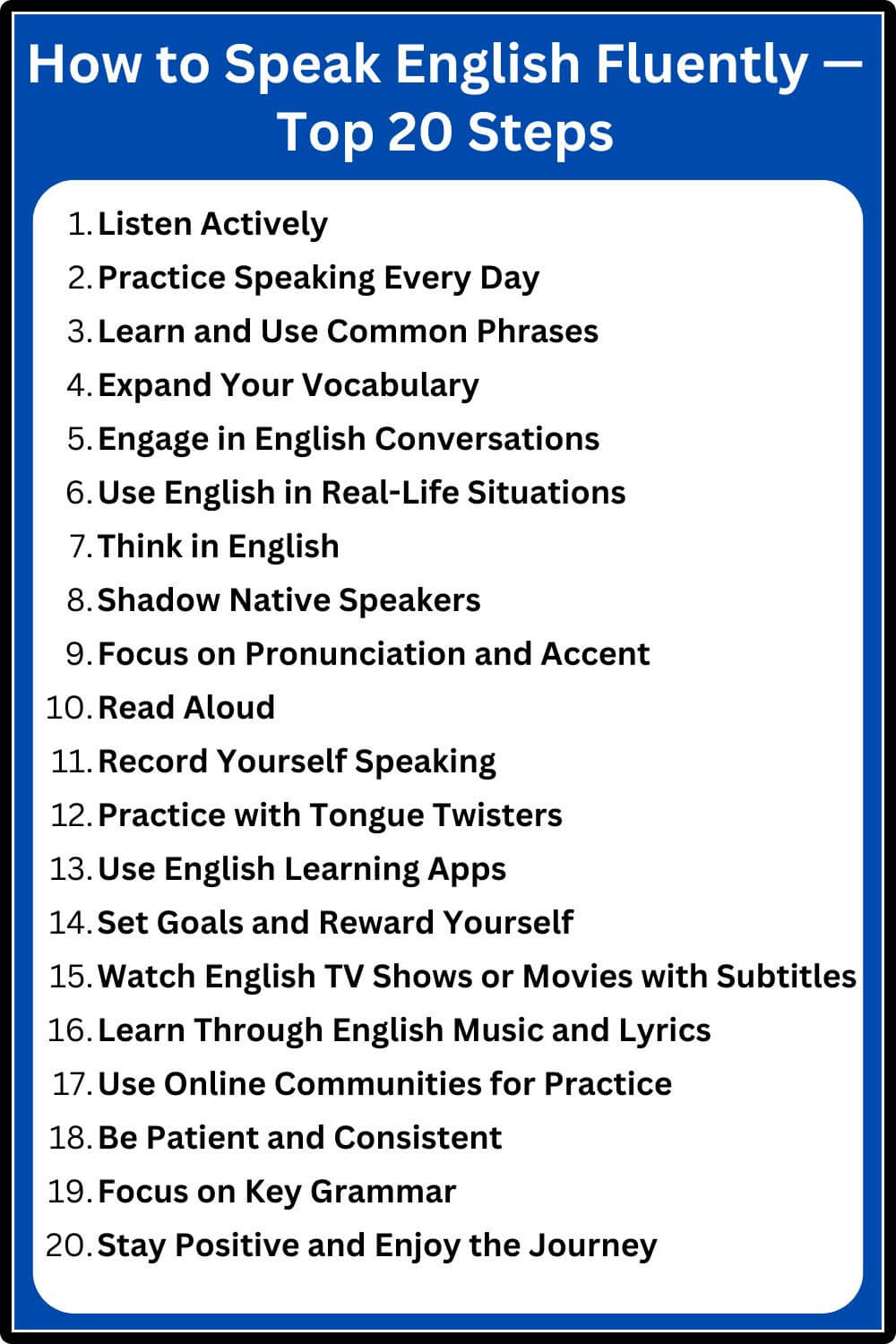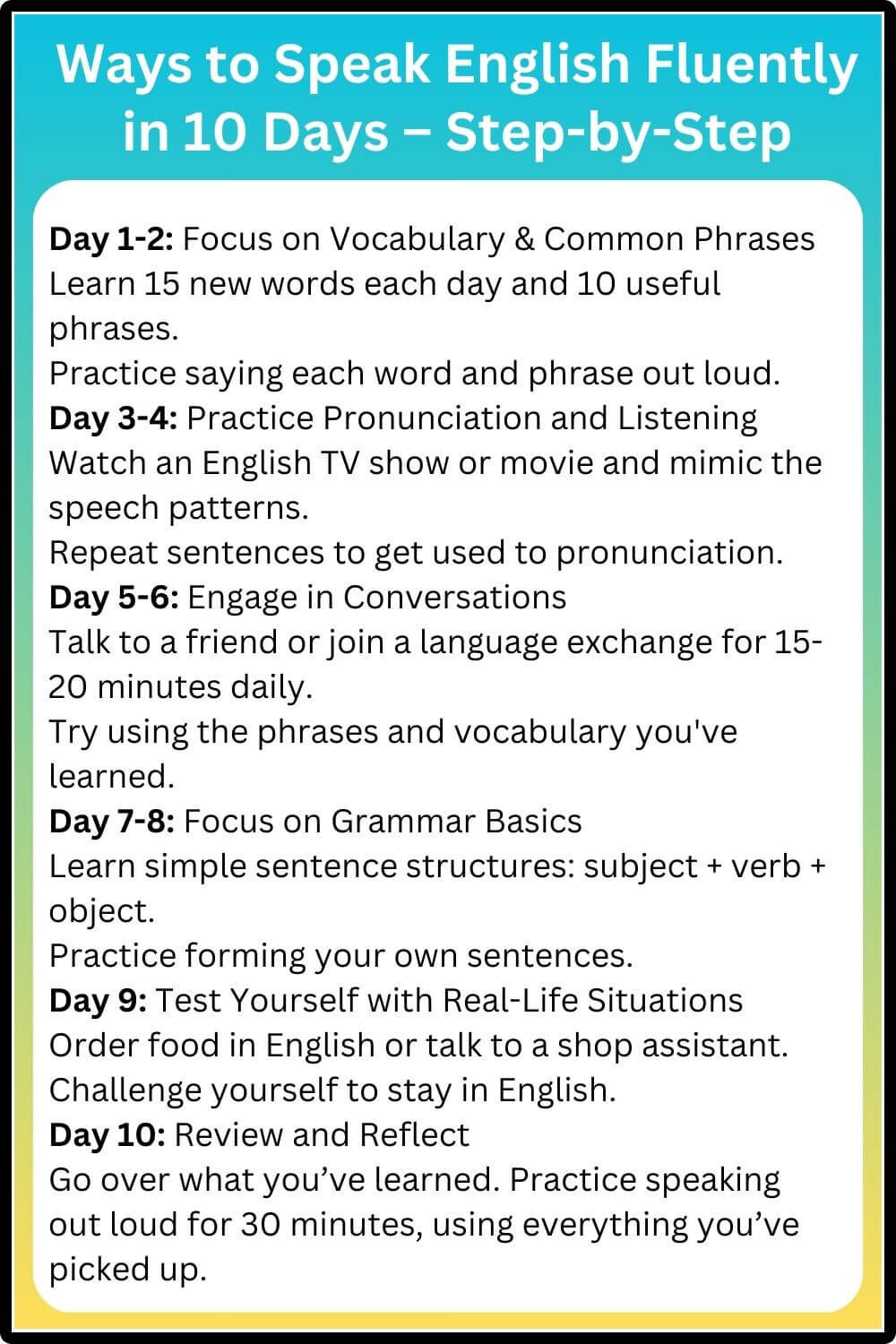Learning to speak English fluently is a common goal for many, whether for personal growth, travel, or career advancement. Speaking English opens doors to new experiences and connections across the globe. But fluency takes practice and dedication. This guide will show you effective methods for beginners to start speaking English fluently in achievable steps.
How to Speak English Fluently for Beginners
Starting to speak English fluently as a beginner might feel challenging, but taking it step by step can make it easier. Here are some simple tips to help you build confidence and improve your English-speaking skills:
Set Small Goals:
Start with small, easy goals. For example, try to practice English for 10-15 minutes each day. Focus on pronouncing words clearly and learning a few new words each time. Small steps will help you improve over time.
Start Simple Conversations:
Begin with basic topics, like introducing yourself or talking about your daily activities. These are everyday conversations that help you practice words and phrases you’ll use often.
Practice Pronunciation Early On:
Good pronunciation is important in English. Watch videos on YouTube to listen to native speakers. Try copying how they say words to help train your ears and voice. This will make it easier to be understood when you speak.

How to Speak English Fluently — Top 20 Steps
Achieving fluency in English takes dedication, consistency, and a willingness to practice every day. Here are 20 essential steps that will guide you through your journey to becoming a fluent English speaker. Each step is designed to build your confidence, improve your skills, and make the learning process enjoyable! lets start to learn speak English like a native speaker.
1. Listen Actively
Listening is one of the most powerful tools in language learning. Immerse yourself in English audio—this could be music, podcasts, or movies. When you listen, focus on the pronunciation of words, the rise and fall of the speaker’s voice (intonation), and how phrases are put together. Active listening will help you understand how native speakers sound and help you pick up commonly used expressions.
2. Practice Speaking Every Day
Speaking is key to fluency, and the more you do it, the more confident you’ll become. Try to speak English daily, even if it’s just a few sentences. Find a friend, language partner, or use a language exchange app like HelloTalk. Practicing every day keeps your skills sharp and helps you improve over time.
3. Learn and Use Common Phrases
Memorizing common phrases is a great way to start speaking more naturally. Phrases like “How’s it going?” or “I’m just looking around, thanks” help you respond in real-life situations. Practicing these phrases helps you speak with ease and familiarity.
4. Expand Your Vocabulary
Try to learn 5-10 new words each day, focusing on words you’ll actually use in conversations. Choose words related to your daily life, like those for food, hobbies, or work. Practice using them in sentences so they become part of your speaking vocabulary, not just words you recognize.
5. Engage in English Conversations
Talking with native speakers, if possible, is one of the most effective ways to learn. If you can’t find native speakers, join an English-speaking group or an online community. Real conversations will improve your fluency, help you learn new words, and build your confidence in speaking.
6. Use English in Real-Life Situations
Find situations where you must use English—this could be ordering at a café, talking with a store clerk, or asking for directions. Putting yourself in real-life situations helps you feel more comfortable speaking English and teaches you how to handle conversations under pressure.
7. Think in English
Start thinking in English rather than translating from your native language. When you think in English, it’s easier to form sentences quickly and naturally. For example, try thinking of your grocery list, your to-do list, or even your daily thoughts in English.
8. Shadow Native Speakers
Shadowing is when you listen to a native speaker and repeat what they say right after. This technique helps you improve pronunciation and intonation. You can find a short video or audio clip, pause after each sentence, and repeat exactly how they say it.
9. Focus on Pronunciation and Accent
Good pronunciation is essential for being understood. Spend a little time each day working on difficult sounds. Practicing these sounds in isolation helps your speech sound clearer and more fluent. Don’t worry too much about having a perfect accent; just focus on being understood.
10. Read Aloud
Reading aloud is great for practicing pronunciation, improving speaking rhythm, and getting used to forming English sentences. Pick a book or an article that interests you and read it out loud. It’s a simple exercise, but it will make a big difference in how confident you feel speaking English.
11. Record Yourself Speaking
Recording yourself helps you hear how you sound and identify areas for improvement. When you play back the recording, listen to your pronunciation, tone, and sentence structure. This helps you become aware of any mistakes and makes it easier to work on them.
12. Practice with Tongue Twisters
Tongue twisters are a fun way to improve pronunciation and clarity. They help you practice difficult sounds, strengthen your mouth muscles, and make your speech more fluid. Try saying, “She sells seashells by the seashore,” for example, and see how fast and accurately you can go.
13. Use English Learning Apps
Apps like Duolingo, Memrise, and Babbel are excellent for building vocabulary, improving pronunciation, and keeping you motivated. These apps offer games, quizzes, and daily goals that make learning fun and interactive.
14. Set Goals and Reward Yourself
Setting small, achievable goals helps you stay motivated. Try setting a goal like learning 10 new phrases or practicing with a friend for 10 minutes each day. Every time you reach a goal, reward yourself with something you enjoy, like watching a favorite show in English.
15. Watch English TV Shows or Movies with Subtitles
Start watching English shows with subtitles in your language. This helps you understand what’s being said. Once you feel more comfortable, try watching with English subtitles or even without any. Watching without subtitles challenges your listening and comprehension skills.
16. Learn Through English Music and Lyrics
Music is a fun way to learn English. Listen to songs, read the lyrics, and sing along. Songs often use slang and idioms, so they’re a good way to pick up informal language. Singing along also helps with pronunciation and fluency.
17. Use Online Communities for Practice
Online forums, language exchange groups, and social media groups are great for connecting with others who are learning English. Sites like Reddit, dedicated Facebook groups, or online forums offer ways to practice English and share your progress.
18. Be Patient and Consistent
Fluency doesn’t happen overnight, and that’s okay. Stay consistent with your practice and be patient with yourself. Each day you practice brings you closer to your goal. Regular practice and patience are key to seeing real progress.
19. Focus on Key Grammar
Learning basic grammar structures will help you speak more naturally. Start with simple sentences, such as subject-verb-object (like “I eat breakfast”). Knowing basic grammar makes it easier to form sentences and helps you communicate clearly.
20. Stay Positive and Enjoy the Journey
Learning English can be challenging, but staying positive makes the process more enjoyable. Celebrate your achievements, no matter how small, and have fun with the language. The more you enjoy the journey, the faster you’ll improve.

Ways to Speak English Fluently in 10 Days—Step-by-Step
Can you improve your English in just 10 days? This doesn’t mean complete fluency, but you can make noticeable progress in just a short time. Here’s a 10-day plan:
Day 1-2: Focus on Vocabulary & Common Phrases
- Learn 15 new words each day and 10 useful phrases.
- Practice saying each word and phrase out loud.
Day 3-4: Practice Pronunciation and Listening
- Watch an English TV show or movie and mimic the speech patterns.
- Repeat sentences to get used to pronunciation.
Day 5-6: Engage in Conversations
- Talk to a friend or join a language exchange for 15-20 minutes daily.
- Try using the phrases and vocabulary you’ve learned.
Day 7-8: Focus on Grammar Basics
- Learn simple sentence structures: subject + verb + object.
- Practice forming your own sentences.
Day 9: Test Yourself with Real-Life Situations
- Order food in English or talk to a shop assistant. Challenge yourself to stay in English.
Day 10: Review and Reflect
- Go over what you’ve learned. Practice speaking out loud for 30 minutes, using everything you’ve picked up.
Conclusion
Learning to speak English fluently is a journey, but with these steps and a consistent approach, even beginners can gain confidence and make remarkable progress. The key is daily practice, learning in manageable chunks, and building up your courage to communicate naturally. Keep challenging yourself and, most importantly, enjoy the process of speaking English fluently!

